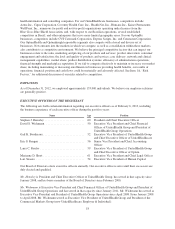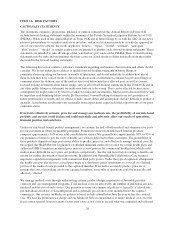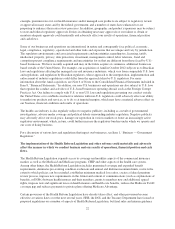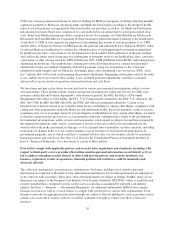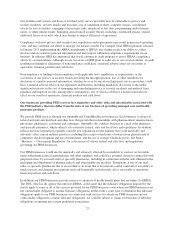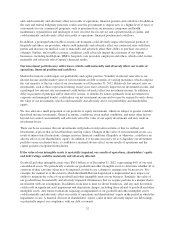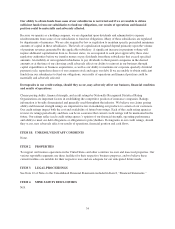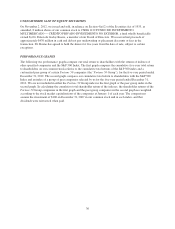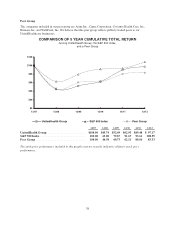United Healthcare 2012 Annual Report Download - page 30
Download and view the complete annual report
Please find page 30 of the 2012 United Healthcare annual report below. You can navigate through the pages in the report by either clicking on the pages listed below, or by using the keyword search tool below to find specific information within the annual report.UnitedHealthcare Employer & Individual recently began to transition pharmacy benefit management for
approximately 12 million of its commercial members, including pharmacy claims adjudication and customer
service, from Express Scripts’ subsidiary, Medco Health Solutions, Inc., to OptumRx. If our customers are not
satisfied with our pharmacy benefit management services as a result of this transition, UnitedHealthcare
Employer & Individual could face loss of business, which could adversely impact our results of operations,
financial position and cash flows.
If we fail to compete effectively to maintain or increase our market share, including maintaining or
increasing enrollments in businesses providing health benefits, our results of operations, financial position
and cash flows could be materially and adversely affected.
Our businesses compete throughout the United States and face significant competition in all of the geographic
markets in which we operate. We compete with other companies on the basis of many factors, including price of
benefits offered and cost and risk of alternatives, location and choice of health care providers, quality of
customer service, comprehensiveness of coverage offered, reputation for quality care, financial stability and
diversity of product offerings. For our UnitedHealthcare businesses, competitors include Aetna Inc., Cigna
Corporation, Coventry Health Care, Inc., Health Net, Inc., Humana Inc., Kaiser Permanente, WellPoint, Inc.,
numerous for-profit and not-for-profit organizations operating under licenses from the Blue Cross Blue Shield
Association, and, with respect to our Brazilian operations, several established competitors in Brazil, and other
enterprises that serve more limited geographic areas. For our OptumRx businesses, competitors include CVS
Caremark Corporation, Express Scripts, Inc. and Catamaran Corporation. Our OptumHealth and OptumInsight
reportable segments also compete with a broad and diverse set of businesses.
In particular markets, competitors may have greater capabilities, resources or market share; a more established
reputation; superior supplier or health care professional arrangements; better existing business relationships; or
other factors that give such competitors a competitive advantage. In addition, significant merger and acquisition
activity has occurred in the industries in which we operate, both among our competitors and suppliers (including
hospitals, physician groups and other care professionals). Consolidation may make it more difficult for us to
retain or increase our customer base, improve the terms on which we do business with our suppliers, or maintain
or increase profitability. If we do not compete effectively in our markets, if we set rates too high or too low in
highly competitive markets, if we do not design and price our products properly and competitively, if we are
unable to innovate and deliver products and services that demonstrate value to our customers, if we do not
provide a satisfactory level of services, if membership or demand for other services does not increase as we
expect or declines, or if we lose accounts with more profitable products while retaining or increasing
membership in accounts with less profitable products, our business, results of operations, financial position and
cash flows could be materially and adversely affected.
If we fail to develop and maintain satisfactory relationships with physicians, hospitals, and other health
care providers, our business could be materially and adversely affected.
We contract with physicians, hospitals, pharmaceutical benefit service providers, pharmaceutical manufacturers,
and other health care providers for services. Our results of operations and prospects are substantially dependent
on our continued ability to contract for these services at competitive prices. Failure to develop and maintain
satisfactory relationships with health care providers, whether in-network or out-of-network, could materially and
adversely affect our business, results of operations, financial position and cash flows.
In any particular market, physicians and health care providers could refuse to contract, demand higher payments,
or take other actions that could result in higher medical costs, less desirable products for customers or difficulty
meeting regulatory or accreditation requirements. In some markets, certain health care providers, particularly
hospitals, physician/hospital organizations or multi-specialty physician groups, may have significant market
positions or near monopolies that could result in diminished bargaining power on our part. In addition,
accountable care organizations (ACOs), practice management companies, which aggregate physician practices
28


